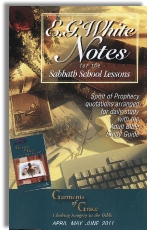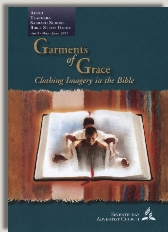|
||||||||||||||
Commentary on "The Coat of Different Colors"
Day 2: Sunday, April 17, 2011 - The Genesis of a Family Disaster
Overview
The lesson today attempts to show that the dysfunction and sin of Jacob's life shaped the character of his sons. While this is undoubtedly true, there is a bigger reality underlying this story.
Observations
During the period of Enlightenment, Deism was one of the favorite views of many educated Americans. Before Darwin came with an explanation for the design found in the human and animal world, it was felt that the existence of God was a necessary belief for an explanation of the world which looked like an organized mechanism, planned and designed by an architect. Aside from this original function as the Unmoved Mover and the Author of nature’s laws, deists thought God was aloof, outside the universe which He designed, never interfering in it’s operation. God was the watchmaker, the universe was the watch, a perfect mechanism, a closed system to any supernatural intervention, a system operating exclusively under the cause-effect equation in which the laws of karma had full reign. For every step in the wrong direction, a negative effect was inevitable. Since God would not interfere, there was no redemption, no correction—nothing that would prevent the law of cause-effect to work like an implacable destiny.
Sunday’s lesson brings a similar universe on the stage. Instead of the God of theism, a sovereign God who not only created everything but also sustains everything with his power, with all things depending on Him every moment (Col. 1:16,17), the universe pictured is one in which the creation is the first and last cause. "Everything impacts just about everything."
In biblical theism, God is Sovereign; He has the last word. Nothing, not even sin, happens without God bearing the ultimate responsibility. God, as sustainer, can make any man drop dead in a second or can make him ill in order to prevent him doing a sinful deed. If man sins, it’s ultimately God’s responsibility, yet God is not sin's author. In His providence and for His inscrutable purposes, man's sin fits under the "umbrella" of God's sovereign will. He can also change the effects of sin and turn something bad into something good ( Genesis 50:20). Joseph's story is one of the best biblical examples of God’s sovereignty, with his brothers selling him with an evil intent and God allowing this sin with good intent, to save Jacob’s family from famine.
Nothing of this sort happens in a deistic universe. From a deistic perspective, God doesn’t prevent sin, and neither does He allow it for good causes. In the equation of what happens in the universe, people’s sins exert an influence that is ultimate. One sin has so much power that the effects are unlimited. Man’s power is so great that the lessons says: "Your body exerts a gravitational pull not only on your neighbor but on the sun and everything else in the created world". It seems that nothing can hinder this influence. It seems that God is not even present, all things are working in a mechanical way, with no personal presence coming from outside that limits the effects created by the internal workings of creation.
In this context, Jacob's sin and his polygamy are presented as having a bigger impact than the Bible allows. The author tries to impress his readers with the enormous effect of sin in order to make them afraid of doing sin because of far reaching bad consequences. There is no hint that it was God’s plan to have such a dysfunctional family because He wanted to show His grace, His power, to redeem all of them and present this family as a trophy of grace. If He had a different plan, He could as easily prevent anything in the story to happen and cancel the apparent effects of Jacob’s sin right from the beginning.
From Ellen White's Patriarchs and Prophets, the author quotes a part in which Jacob’s polygamy is blamed for almost everything negative that follows it: "The results of polygamy were manifest in the household. This terrible evil tends to dry up the very springs of love, and its influence weakens the most sacred ties."
Something is missing at this point. It’s ironic that despite a belief in a deterministic world found in the affirmation that what we are is shaped by forces outside our control, the original sin and its reality don't get into the picture. The biblical "determinism", with Adam's sin putting the entire race under death (Romans 5:12) to the degree that all who born in this world are spiritually dead, children of wrath (Ephesians 2:1-5), is implicitly denied. According to Ellen White, Jacob's sin dried up the very springs of love and weakened the most sacred ties, assuming that the sons of Jacob were born like Adam was created, good, but unfortunately for them they were born in a polygamous family that destroyed the good material with which they came in the world. This view is implicitly Pelagian, a fourth century heresy that doesn’t have place in the Christian system.
Pelagius, a monk who was preoccupied with leaving no excuse for sin, advanced the idea that man doesn't inherit anything from Adam, being born with a nature which is morally good, as Adam's nature was before the fall. He explained the existence of sin and universal corruption of the human race as coming from the external influence of the society. Sin was multiplied by example, not by transmission from one generation to another. In all fairness, Adventists rejected the Pelagian view of sin, speaking about a human nature inclined to sin. Nevertheless it placed the Christian view of original sin under the category of pagan corruption. In practical terms, the difference between the Pelagian view of sin and the Adventist description of Jacob's sin's effect on his family is indistinguishable. It matches the practical deistic view of a deterministic universe in which God is not sovereign and man is the master of his fate, the captain of his soul—even though the Adventist soul is a material, not immaterial, soul identical with the physical body.
Summary
- Man's sins are not the powerful forces in the world that Adventism presents them to be.
- Adventism sees the world almost in a deistic fashion; man's choices and decisions affect everything around them including the next generations, while God must remain remote and non-involved in order to protect human "free will".
- The biblical view of God rightly places God as sovereign over everything, even over sin, and He takes ultimate responsibility for everything that happens.
- Studying the story of Jacob and his family as an object lesson designed to teach students not to sin is missing the point.
- God was sovereign over Jacob and his sin; even though Jacob and his sons sinned, sometimes with the intent to do harm to another, God permitted their sin and used it as the means of accomplishing great good for His glory.
- We are accountable to God for our choices; He is not thwarted by them. He is sovereign over us; He has the last word about the outcomes of human interactions.
Copyright 2011 BibleStudiesForAdventists.com. All rights reserved. Revised April 14, 2011. This website is published by Life Assurance Ministries, Glendale, Arizona, USA, the publisher of Proclamation! Magazine. Contact email: BibleStudiesForAdventists@gmail.com.
The Sabbath School Bible Study Guide and the corresponding E.G. White Notes are published by Pacific Press Publishing Association, which is owned and operated by the Seventh-day Adventist church. The current quarter's editions are pictured above.
Official Adventist Resources
Standard Edition Study Guide Week 4
Teacher's Edition Study Guide Week 4
Easy Reading Edition Study Guide Wk 4
Search the Complete Published Ellen G. White Writings
Please Support This Project


